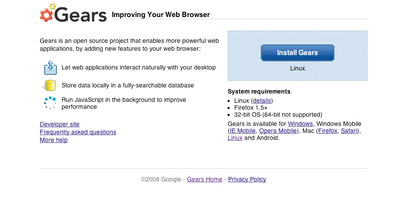Why free web services aren't really free
We're just trading one closed-source app for another

I'm not going to bore you by talking about free beer versus free speech – that's an old argument and one with which I hope you're familiar by now. Instead, I want you to focus on the web services you rely on. Think Google. Think Gmail. Think Twitter, Facebook, Last.fm or any number of others.
Large chunks of your life are likely to rely on these companies continuing to provide their services to you for free, but are they free software? Of course not – but the problem is that most folks don't even consider that question.
In the old days, JavaScript was a simple glue layer that added snippets of functionality to the web. Dynamic HTML meant that web pages could react a little bit to user input. But really it's the rise of Ajax, which enables web pages to send and receive data without reloading the whole page, that's powering a new generation of websites and enabling people to produce increasingly powerful apps that run entirely inside your web browser – you only need look at the Chrome Experiments to see just how much JavaScript can do.
Thanks to its developers, OpenOffice.org is approaching feature parity with Microsoft Office, and Evolution now functions as a drop-in replacement for Microsoft Outlook. But if more people rely on web-based services such as Gmail or Google Docs, which aren't available under a free software licence, aren't we giving up our freedom just as we're on the verge of removing the proprietary shackles once and for all?
This isn't about being online
You might think that OpenOffice.org will always have a place, given that it runs anywhere, anytime. That's true, at least for now, but Google, Adobe, Microsoft and others are committing huge resources to producing software architectures that enable web apps to work as well offline as they do online.
With Gmail, for example, Google's 'Gears' technology stores an offline cache of your inbox so you can carry on working even when your connection is gone. And it's not just partial functionality – you can read emails, write responses and do pretty much anything you'd do online. As soon as you reconnect to the web, Gears sends all the emails sitting in your outbox, just as if you were using a traditional email client.
Sign up for breaking news, reviews, opinion, top tech deals, and more.

GEARS: Google Gears enables JavaScript-based web applications to function offline, making them work locally just like traditional desktop apps
If you're thinking, "Well, it's one thing getting email to work, but getting their online spreadsheet or word processor to function is much harder," then I'm afraid you're wrong: Google Docs works offline and has done for a year. People are already giving up computer freedoms without even realising it.
Take personal information: Facebook recently tried to change its terms of service so that data you uploaded could be used by the company even after you terminated your account. Users across the world revolted and made the company rethink its plans, but it shows how little control we have over data that's stored on another company's servers.
Being "in the cloud" might set off buzzword alarms, but it does accurately depict the nebulous, uncertain location of our data. Just where are your Google documents stored? If you ever wanted to transfer your Facebook life to a different server, is there a way to move everything you've built there to another site?